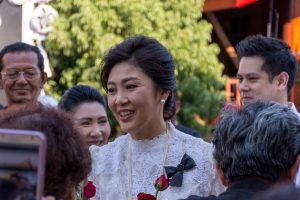Exiled former Thai Prime Minister Yingluck Shinawatra could soon be reunited with her brother in Thailand, after a Thai court acquitted her yesterday on charges of mishandling funds for a government project in 2013.
According to The Associated Press, which cited a statement from the Supreme Court’s Criminal Division for Political Office-Holders, the judges unanimously acquitted Yingluck and five other defendants accused of mishandling 240 million baht ($6.7 million). The defendants were accused of failing to hold a proper bidding process for a 2013 campaign to promote an ambitious infrastructure plan initiated by Yingluck’s government, which was overthrown in a coup in 2014.
In the statement, all nine judges said that the defendants had “no intention” of benefitting the two major media outlets that won the contract at the time. “The project was done according to the regulations,” the court statement added.
The ruling came shortly after Thaksin, Yingluck’s brother, was released on parole for corruption-related offenses last month. Thaksin, who was overthrown in a separate coup in 2006, was released after serving six months of an eight-year prison sentence for corruption-related charges that prompted him to flee the country in 2008.
Thaksin’s rehabilitation was made possible by the new alliance between the Shinawatra-aligned Pheu Thai Party and the forces of the royalist conservative establishment, whose conflict had dominated the past two decades of Thai politics. Yingluck was elected the country’s first female prime minister in 2011, as Thaksin’s proxy, before being removed from power by a coup in 2014. She fled overseas in 2017, shortly before the Supreme Court found Yingluck guilty of negligence in connection with a controversial rice subsidy scheme and sentenced her to five years in prison.
Thaksin’s return to Thailand last August, and subsequent rehabilitation, have since prompted speculation that the same clemency could be extended to Yingluck. As with the charges filed against Thaksin after 2006, supporters of the Shinawatras claim that the charges against Yingluck were politically motivated as part of the long-running struggle between the influential northern family and the conservative establishment clustered around the monarchy and the Royal Thai Army.
Yesterday’s ruling suggests that Yingluck’s own return is simply a matter of time. In December, the same Supreme Court body cleared Yingluck of abuse of power in connection with a personnel transfer that she had overseen, overriding previous court rulings.
As the AP points out, however, the five-year sentence handed to Yingluck in 2017 still stands, meaning that she will also need a royal pardon if she is to join her brother in the lush expanses of Ban Chan Song La, the Shinawatra family mansion in western Bangkok.
But given that this was granted to Thaksin, there is no reason why it couldn’t happen in relatively short order. For the guardians of Thailand’s established political order, the emergence of the progressive Move Forward Party (MFP) as a serious force at last year’s election has cast the Shinawatra family in a more favorable light. The MFP won widespread support on a much more radical platform than the Shinawatras ever advanced, pledging to break up powerful business monopolies, end military conscription, and – most controversially – amend the severe law that criminalizes even the most innocuous criticisms of the monarchy and the king.
As such, the establishment now has a strong motivation to end its long-running feud with the Shinawatras in order to check the emergence of the longer-term threat posed by the MFP. This naturally requires that the war comes to an end, and that the politically motivated charges confected during the political war with the Shinawatras are politically alleviated.
Make no mistake: Despite being draped in legal justifications, these are purely political decisions – a reminder that in politically-hued cases, Thailand’s courts ultimately remain servants of the conservative establishment. That these same courts are now going after the MFP, treating it to the same brand of legal warfare that once targeted the Shinawatras (and the MFP’s predecessor Future Forward), only underscores the point.

































